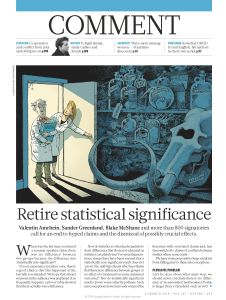Join getAbstract to access the summary!

Join getAbstract to access the summary!
Valentin Amrhein, Sander Greenland and Blake McShane
Retire Statistical Significance
Valentin Amrhein, Sander Greenland, Blake McShane and more than 800 signatories call for an end to hyped claims and the dismissal of possibly crucial effects.
Nature, 2019
What's inside?
Scientists may have to abandon referring to the differences between data as “statistically significant.”
Recommendation
Researchers commonly refer to the differences between sets of data – measures from different treatment groups, for example – as being (or not being) “statistically significant.” The sets are considered significantly different only if an arbitrary statistical threshold is exceeded. If it isn’t, people often conclude that there is no difference between the sets of data. This assumption, however, is not necessarily valid. A sub-threshold finding may still be relevant. And, as Carl Sagan put it, absence of evidence is not evidence of absence. A group of over 800 scientists is now calling to “retire statistical significance.” The article will engage and inform anyone concerned that statistical analyses can be misleading but were never quite sure exactly how or why.
Summary
About the Authors
Valentin Amrhein is a professor of zoology at the University of Basel, Switzerland. Sander Greenland is a professor of epidemiology and statistics at the University of California, Los Angeles. Blake McShane is a statistical methodologist and professor of marketing at Northwestern University in Evanston, Illinois.


















Comment on this summary
On the other hand, the use of statistics in finance and market modelling has led to 'bad science'. The 'mathsness' perpetuates the fallacies of atomised self-interested individuals, maximising their own utility at the sake of others - and 'magically' out of this chaos of egoism all arrive at a utoptian and mathematically derived equilibrium.
Maybe if stats were not something that were lorded over people, then they would be respected and understood.